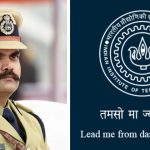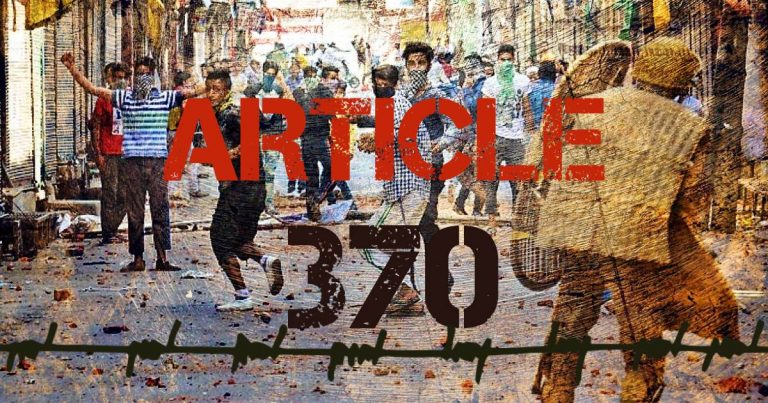The revocation of Article 370 has become the talk of the town these days. Almost everybody seems to be talking about this. The liberal Intelligentsia is behaving insanely as if their personal property has been forcibly taken out of their possession. They are insanely debating right to self-determination of J&K, the snubbing of so-called consent of the majority community before the revocation and not following the due process in revoking Article 370 from the Constitution of India. Let us analyze their claims and contentions.
Self-determination of J&K is neither permitted in the Constitution of India nor was it permitted in the Constitution of Jammu & Kashmir. The Constitution of India doesn’t talk about the right to self-determination of any state including J&K. On the contrary, it talks about India’s integration in its very preamble. Even the preamble of the Constitution of J&K, 1956, stated that J&K is an integral part of the Union of India. Section 3 coming under Part II of the J&K Constitution stipulated that “The State of Jammu and Kashmir is and shall be an integral part of the Union of India.”
India’s international stance on ‘Right to Self-determination’ is this:-
“The Government of the Republic of India declares that the words ‘the right of self-determination’ appearing in [this article] apply only to the peoples under foreign domination and that these words do not apply to sovereign independent States or to a section of a people or nation which is the essence of national integrity.” (UNGA 1966)
This clearly implies that the said right can only apply and extend to the people under foreign dominations, for instance, colonialism. It doesn’t apply to postcolonial situations at all. Since India is a sovereign independent nation, there is no question of application of this right on its sovereign independent territory.
Thus, it is amply clear that neither India’s Constitution nor India’s international stance on right to self-determination supports such clamors from the valley.
There has been an intermittent clamor for the right to self-determination in certain parts of North-East India too, though gradually such clamors have become largely insignificant in these regions. Our Country suppressed separatist movement in Punjab at such a tremendous cost of its time, resources and energy that could have been utilized for a better purpose.
This is not merely about J&K, this is about setting up a pernicious precedent. If India permits self-determination of J&K, it will open a Pandora’s Box for such demands from other parts of the Country. All the separatist movements in other parts of the country which have been successfully suppressed by the governments will regain their momentum on this pretext. It will strengthen their idea and resolve. They will also think that they can also succeed someday. We cannot think this issue from a unilateral perspective. We need to have a multilateral approach on the issue and a necessity for us to be more pragmatic than technical.
Markandey Katju, a staunch proponent of Pt. Nehru’s philosophy has categorically debunked the demand for self-determination. He himself hails from the State of J&K. This is what he has to say on the self-determination of Kashmir and its after-effects.
If religious majoritarianism is considered as a basis of the right to self-determination, then India should have allowed Punjab to secede by this logic. After all, such huge militant movements had taken place in Punjab for the demand of ‘Khalistan’. This militant movement was no less in intensity than the present militant movement in J&K. Applying identical logic, India should have allowed some parts of the North-East as well to secede as they too are religiously and culturally distinct from rest of India. But, can this be done? Can any independent sovereign nation permit this? The answer is a resounding ‘No’.
Also, if religious majoritarianism or the sentiment of the majority community of a State is going to be a ground for running our Nation, then the majority community of India wants India to be officially declared as ‘Hindu Rashtra’? Why shouldn’t the Country revere the sentiment of Hindus by declaring it as a Hindu Rashtra, applying the same logic? Why construction of Ram Mandir should be done legally or constitutionally, why not through a plebiscite?
As per the crux of liberal intelligentsia’s arguments, ‘Hindu Majoritarianism’ is fascism, but ‘Muslim majoritarianism’ is ‘Secularism’ and ‘Right to Self-determination’. This hypocrisy is not going to work anymore as the Country has understood this appeasement policy and the true intent of the so-called secular and liberal intelligentsia that is often camouflaged in cunning Constitutional jargons.
A certain section of society also argues that India has occupied J&K by force. This claim is a height of hilariousness. There is no question of occupancy at all. One’s own land is not occupied. J&K has been an integral part of India as per the Indian Constitution as well as the erstwhile Constitution of J&K. Moreover, J&K is not just about the valley, it is also about Jammu, Leh & Ladakh. The people of these regions are the real minority of J&K. Why do not people care for their sentiment? Why so much infatuation for Muslim appeasement in this Country?
Article 370 was the creation of the Indian Constitution. It was our Constitution which gave this status to this State to exercise a great amount of autonomy and stopped the reference of the Centre save on certain subjects. This article was specifically titled as ‘Temporary Provision’ with respect to the State of Jammu & Kashmir’. The point that is pertinent to consider here is the intent of the founding fathers of our Constitution behind categorizing this Article as a ‘Temporary provision’? Obviously, they would have thought that as and when the situation becomes normal this provision would be revoked. But, this didn’t happen for 70 years because of the appeasement policy. Instead, it was being fraudulently characterized as a permanent provision of the Constitution.
The intent of the framers of the Constitution can be gauged from the response given by the Constituent Assembly member Mr. N. Gopalaswamy Ayyangar to another member Mr. Maulana Hasrat Mohani during the Constituent Assembly debates for the insertion of Article 306 A in the Constitution of India that was later renumbered as Article 370 of the Constitution.
When Mr. Ayyangar read out the motion for the insertion of this Article, Maulana Hasrat Mohani asked, ‘Why this discrimination, please’? He was referring to the colossal concessions given to the State of J&K through this Article. To his question, Mr. Ayyangar responded, “The discrimination is due to the special conditions of Kashmir. That particular State is not yet ripe for this kind of integration (referring to the normal integration of other princely states). It is the hope of everybody here that in due course even Jammu and Kashmir will become ripe for the same sort of integration as has taken place in the case of other States. He further adds, ‘Now, if you remember the viewpoints that I have mentioned, it is an inevitable conclusion that, at the present moment, we could establish only an interim system. Article 306A is an attempt to establish such a system. Thus, it is clear that this provision was intended to be absolutely interim & temporary in its character.
Mr. N. Gopalaswamy Ayyangar while explaining the provisions of this Article to the Assembly further noted which holds crucial importance here that “The last clause refers to what may happen later on. We have said article 211A will not apply to the Jammu and Kashmir State. But, that cannot be a permanent feature of the Constitution of the State, and hope it will not be.”
Therefore, it is clear that the founding fathers of our Constitution did not intend to make this provision a permanent feature of the Constitution. It should have been erased from our fundamental legal document long ago. The people instead of protesting its abrogation should regret its inordinately delayed revocation.
You will also like :



